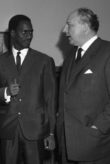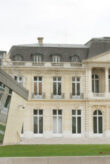The ball is round and one game lasts 90 minutes. A penalty kick is taken at a distance of 11 meters and each team needs a captain.
Presently, these and many other regulations of the world’s most famous sport are laid down in the over 200 pages of the Fifa rules of the International Football Association Board and are further developed on an ongoing basis. But what are the origins of these regulations, in fact?
Konrad Koch taught Latin, Greek, German and history at the Martino-Katharineum (MK), a secondary school in Braunschweig, and organized the first football match in Germany in 1874. At that time, the game was still played with an oval ball procured from England, and with a »spielkaiser« (»emperor of the game«) who acted both as the captain of his 15-member team and as the referee. What’s more, picking up the ball and playing with it with one’s hands was permitted.
Konrad Koch couldn’t have known at that time what popularity this new »physical exercise« would one day enjoy. Together with a friend and fellow PE teacher, August Herrmann, he established it as a supplement to conventional gymnastics for the students of the boys’ secondary school. Koch was an advocate of outdoor exercise and wanted to support both the athletic performance and the social skills of his students.
In addition to »raffball« (a form of handball) and cricket, football quickly became the students’ favourite sport. In 1875, the first German football club was founded, and Konrad Koch wrote down the first football rules, which were derived from rugby, in a few pages.
The set of rules also included mandatory health rules, as people did not yet have total confidence that this yet unknown sport would be entirely beneficial to its players:
• Frail and sickly students will only be accepted with the permission of a doctor.
• No match may be played without the supervision of a teacher.
• If weather is uncertain, matches will be played on a voluntary basis only.
• Care must be taken when preparing the playing field that students do not have to run against the easterly wind.
• No one may stand idly or lie down on the playing field.
• No student may remove his coat without permission; this permission will only be granted to students wearing a woollen shirt.

Since it was just as rainy in Germany at that time as it is today, both the ball and the players became dirty quickly; for this reason, a rule was introduced that required the ball to be played exclusively with the feet. This version became known as »football without catching«and was, at first, played only in bad weather. Ultimately, in 1882, this version became mandatory when Konrad Koch incorporated it into the set of rules.
Today, there are nearly 25,000 football clubs in Germany, of which over 5,800 are women’s teams that make the game more feminine. Many referees, both male and female, continue to ensure that the football rules are adhered to.
Football was and is contagious
The MK (team) school games were incorporated into the official curriculum of the Martino Katharineum, thus providing an excellent foundation for football to be played and allowing its further expansion.
In 1888, MK students played against teams from Göttingen and Hannover. In 1894, matches against teams from Great Britain and the Netherlands made the game international, leading Koch to take the liberty of stating that, »The question of whether football should be introduced in Germany or not no longer requires debate; it has been decided by the power of fact.«
However, the acceptance of this new team sport here in Braunschweig could not disguise the fact that Konrad Koch and his friends faced several considerable obstacles – not least of which was the sport’s English origins.
Koch published a large number of articles concerning the theory of sport, in which he repeatedly pointed out the benefits of playing football. The title of his most notable work is »Education for valour through gymnastics, games and sport. The intellectual side of physical exercise« (1900).
Even today, students at the Martino-Katharineum have the opportunity each summer to take part in the Konrad Koch street football tournament, thus allowing the memory of Braunschweig’s football pioneer to stay alive. Needless to say, the tournament also devotes attention to ensuring that the measures and standards of the football world are observed to the letter.
Because a teacher in Braunschweig prepared the rules of the game of football, PTB is also able to make sports fields some of the most exact places in the world.
We hope that this footnote in Braunschweig’s history will let you and us enjoy an exciting, entertaining and fair World Cup 2018!








